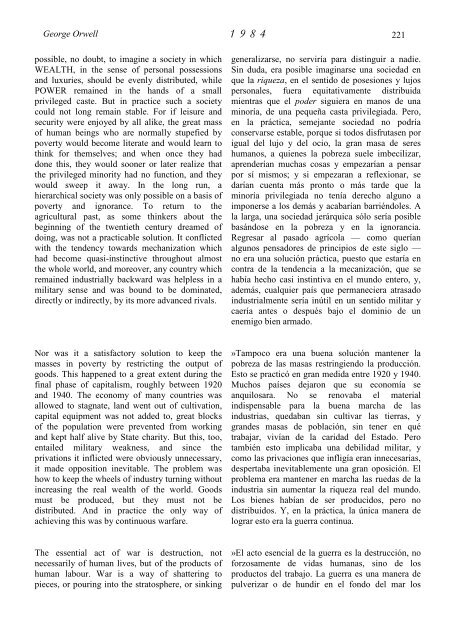Create successful ePaper yourself
Turn your PDF publications into a flip-book with our unique Google optimized e-Paper software.
George Orwell 1 9 8 4<br />
possible, no doubt, to imagine a society in which<br />
WEALTH, in the sense of personal possessions<br />
and luxuries, should be evenly distributed, while<br />
POWER remained in the hands of a small<br />
privileged caste. But in practice such a society<br />
could not long remain stable. For if leisure and<br />
security were enjoyed by all alike, the great mass<br />
of human beings who are normally stupefied by<br />
poverty would become literate and would learn to<br />
think for themselves; and when once they had<br />
done this, they would sooner or later realize that<br />
the privileged minority had no function, and they<br />
would sweep it away. In the long run, a<br />
hierarchical society was only possible on a basis of<br />
poverty and ignorance. To return to the<br />
agricultural past, as some thinkers about the<br />
beginning of the twentieth century dreamed of<br />
doing, was not a practicable solution. It conflicted<br />
with the tendency towards mechanization which<br />
had become quasi-instinctive throughout almost<br />
the whole world, and moreover, any country which<br />
remained industrially backward was helpless in a<br />
military sense and was bound to be dominated,<br />
directly or indirectly, by its more advanced rivals.<br />
Nor was it a satisfactory solution to keep the<br />
masses in poverty by restricting the output of<br />
goods. This happened to a great extent during the<br />
final phase of capitalism, roughly between 1920<br />
and 1940. The economy of many countries was<br />
allowed to stagnate, land went out of cultivation,<br />
capital equipment was not added to, great blocks<br />
of the population were prevented from working<br />
and kept half alive by State charity. But this, too,<br />
entailed military weakness, and since the<br />
privations it inflicted were obviously unnecessary,<br />
it made opposition inevitable. The problem was<br />
how to keep the wheels of industry turning without<br />
increasing the real wealth of the world. Goods<br />
must be produced, but they must not be<br />
distributed. And in practice the only way of<br />
achieving this was by continuous warfare.<br />
The essential act of war is destruction, not<br />
necessarily of human lives, but of the products of<br />
human labour. War is a way of shattering to<br />
pieces, or pouring into the stratosphere, or sinking<br />
221<br />
generalizarse, no serviría para distinguir a nadie.<br />
Sin duda, era posible imaginarse una sociedad en<br />
que la riqueza, en el sentido de posesiones y lujos<br />
personales, fuera equitativamente distribuida<br />
mientras que el poder siguiera en manos de una<br />
minoría, de una pequeña casta privilegiada. Pero,<br />
en la práctica, semejante sociedad no podría<br />
conservarse estable, porque si todos disfrutasen por<br />
igual del lujo y del ocio, la gran masa de seres<br />
humanos, a quienes la pobreza suele imbecilizar,<br />
aprenderían muchas cosas y empezarían a pensar<br />
por sí mismos; y si empezaran a reflexionar, se<br />
darían cuenta más pronto o más tarde que la<br />
minoría privilegiada no tenía derecho alguno a<br />
imponerse a los demás y acabarían barriéndoles. A<br />
la larga, una sociedad jerárquica sólo sería posible<br />
basándose en la pobreza y en la ignorancia.<br />
Regresar al pasado agrícola — como querían<br />
algunos pensadores de principios de este siglo —<br />
no era una solución práctica, puesto que estaría en<br />
contra de la tendencia a la mecanización, que se<br />
había hecho casi instintiva en el mundo entero, y,<br />
además, cualquier país que permaneciera atrasado<br />
industrialmente sería inútil en un sentido militar y<br />
caería antes o después bajo el dominio de un<br />
enemigo bien armado.<br />
»Tampoco era una buena solución mantener la<br />
pobreza de las masas restringiendo la producción.<br />
Esto se practicó en gran medida entre 1920 y 1940.<br />
Muchos países dejaron que su economía se<br />
anquilosara. No se renovaba el material<br />
indispensable para la buena marcha de las<br />
industrias, quedaban sin cultivar las tierras, y<br />
grandes masas de población, sin tener en qué<br />
trabajar, vivían de la caridad del Estado. Pero<br />
también esto implicaba una debilidad militar, y<br />
como las privaciones que infligía eran innecesarias,<br />
despertaba inevitablemente una gran oposición. El<br />
problema era mantener en marcha las ruedas de la<br />
industria sin aumentar la riqueza real del mundo.<br />
Los bienes habían de ser producidos, pero no<br />
distribuidos. Y, en la práctica, la única manera de<br />
lograr esto era la guerra continua.<br />
»El acto esencial de la guerra es la destrucción, no<br />
forzosamente de vidas humanas, sino de los<br />
productos del trabajo. La guerra es una manera de<br />
pulverizar o de hundir en el fondo del mar los


